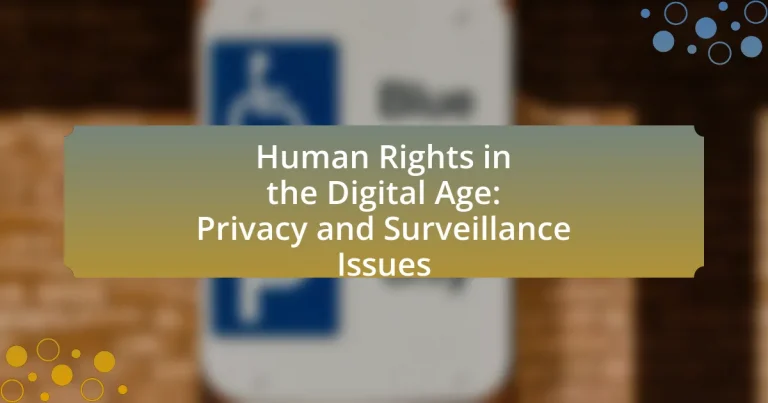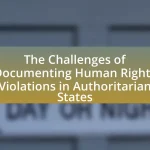Human rights in the digital age encompass the fundamental rights and freedoms individuals possess in relation to digital technology and the internet, including privacy, freedom of expression, and access to information. The article examines how the digital landscape has transformed these rights, highlighting the impacts of surveillance and data collection by governments and corporations. It discusses specific human rights affected by digital technologies, the role of digital platforms in exercising these rights, and the ethical considerations surrounding corporate surveillance. Additionally, the article addresses the implications of privacy violations, the intersection of privacy and surveillance, and the legal frameworks governing these issues, while also exploring future trends and potential reforms needed to protect human rights in an increasingly digital world.
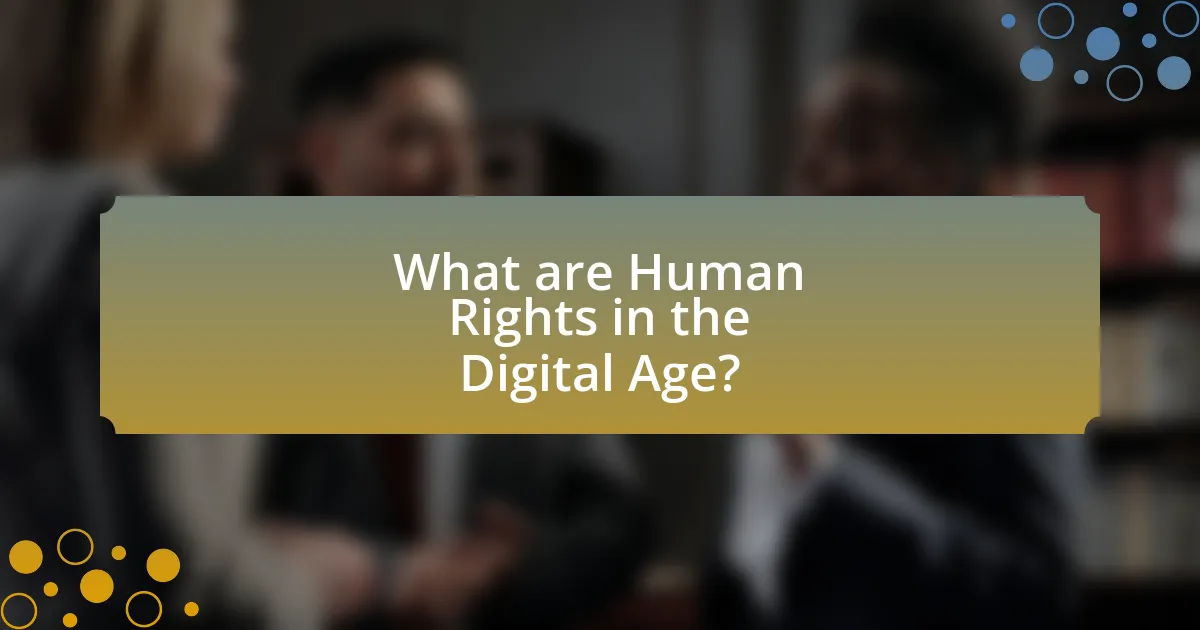
What are Human Rights in the Digital Age?
Human rights in the digital age refer to the fundamental rights and freedoms that individuals possess in the context of digital technology and the internet. These rights include the right to privacy, freedom of expression, access to information, and protection from surveillance. The United Nations has recognized that the same rights that people have offline must also be protected online, as outlined in the 2016 Human Rights Council resolution on the promotion, protection, and enjoyment of human rights on the internet. This resolution emphasizes the importance of ensuring that individuals can exercise their rights without interference, highlighting the need for legal frameworks that protect against unlawful surveillance and data breaches.
How has the digital landscape transformed the concept of human rights?
The digital landscape has transformed the concept of human rights by introducing new dimensions of privacy, surveillance, and access to information. The rise of the internet and digital technologies has led to increased surveillance capabilities by governments and corporations, often infringing on individuals’ rights to privacy as outlined in Article 12 of the Universal Declaration of Human Rights, which states that no one shall be subjected to arbitrary interference with their privacy. Additionally, the digital divide has emerged as a significant issue, where unequal access to technology can exacerbate existing inequalities, impacting the right to education and information. Reports from organizations like Amnesty International highlight how digital surveillance tools can be used to suppress dissent and violate freedom of expression, further illustrating the complex interplay between technology and human rights in the modern era.
What specific human rights are impacted by digital technologies?
Digital technologies specifically impact the right to privacy, freedom of expression, and the right to access information. The right to privacy is compromised through data collection, surveillance, and tracking by both governments and corporations, which can lead to unauthorized access to personal information. Freedom of expression is affected as digital platforms may censor content or restrict access to information, limiting individuals’ ability to communicate freely. Additionally, the right to access information is challenged by digital divides, where unequal access to technology can hinder certain populations from obtaining essential information and services. These impacts are evidenced by numerous reports, such as the United Nations’ Human Rights Council’s findings on the implications of surveillance technologies on human rights.
How do digital platforms influence the exercise of human rights?
Digital platforms significantly influence the exercise of human rights by shaping access to information, enabling freedom of expression, and facilitating surveillance. These platforms provide users with the ability to communicate and share ideas globally, which can enhance democratic participation and advocacy for human rights. However, they also enable governments and corporations to monitor individuals, potentially infringing on privacy rights and freedom of expression. For instance, a report by Freedom House in 2021 indicated that 73 countries experienced a decline in internet freedom, often due to increased surveillance and censorship on digital platforms. This duality highlights how digital platforms can both empower and restrict human rights, depending on their governance and the regulatory frameworks in place.
Why is privacy a fundamental human right in the digital context?
Privacy is a fundamental human right in the digital context because it safeguards individual autonomy and dignity in an increasingly interconnected world. The Universal Declaration of Human Rights, adopted by the United Nations in 1948, recognizes the right to privacy as essential for the protection of personal freedom and security. In the digital age, where personal data is constantly collected, shared, and analyzed, the erosion of privacy can lead to surveillance, discrimination, and a chilling effect on free expression. Studies, such as the 2019 report by the Electronic Frontier Foundation, highlight that without robust privacy protections, individuals are vulnerable to abuses of power by both state and corporate entities, undermining democratic values and personal liberties.
What are the implications of privacy violations in the digital age?
Privacy violations in the digital age lead to significant consequences for individuals and society, including loss of personal autonomy, increased surveillance, and potential misuse of personal data. These violations can result in identity theft, financial fraud, and emotional distress for victims, as evidenced by a 2020 report from the Identity Theft Resource Center, which noted a 47% increase in data breaches compared to the previous year. Furthermore, the pervasive nature of digital surveillance can erode trust in institutions and hinder free expression, as individuals may self-censor due to fear of being monitored. The implications extend to societal norms, where the normalization of surveillance can lead to a culture of compliance and diminished privacy expectations, fundamentally altering the landscape of human rights in the digital age.
How do different cultures perceive privacy in relation to human rights?
Different cultures perceive privacy in relation to human rights in varied ways, influenced by historical, social, and legal contexts. For instance, Western cultures, particularly in Europe and North America, often prioritize individual privacy as a fundamental human right, supported by legal frameworks such as the General Data Protection Regulation (GDPR) in the EU, which emphasizes personal data protection. In contrast, many Asian cultures, such as in China, may prioritize collective security and social harmony over individual privacy, leading to acceptance of surveillance measures that are justified for societal benefits. This divergence is evident in the varying public attitudes towards government surveillance; surveys indicate that citizens in countries like the United States express significant concern over privacy violations, while in countries with more authoritarian governance, such as China, there is often greater acceptance of state monitoring as a trade-off for stability and security.
What role does surveillance play in the digital age?
Surveillance plays a critical role in the digital age by enabling governments and corporations to monitor individuals’ online activities, thereby influencing privacy rights and civil liberties. The rise of digital technologies has facilitated extensive data collection, with reports indicating that over 4.5 billion people are now online, creating vast amounts of personal data that can be tracked and analyzed. This pervasive surveillance often leads to concerns about the erosion of privacy, as evidenced by incidents like the Edward Snowden revelations in 2013, which exposed mass surveillance programs by the NSA. Such practices raise significant human rights issues, as they can lead to self-censorship and a chilling effect on free expression, highlighting the need for robust legal frameworks to protect individual privacy in the digital landscape.
How does government surveillance affect individual freedoms?
Government surveillance significantly restricts individual freedoms by infringing on privacy rights and creating a chilling effect on free expression. When governments monitor communications and activities, individuals may self-censor their speech and actions due to fear of repercussions, leading to a reduction in democratic engagement and dissent. For instance, a report by the American Civil Liberties Union (ACLU) highlights that mass surveillance programs can deter people from participating in protests or expressing unpopular opinions, as they may worry about being targeted or persecuted. This erosion of privacy not only undermines personal autonomy but also poses risks to civil liberties, as seen in various countries where surveillance is used to suppress dissent and control populations.
What are the ethical considerations surrounding corporate surveillance?
The ethical considerations surrounding corporate surveillance include privacy invasion, consent, data security, and potential misuse of information. Corporations often collect extensive data on individuals without explicit consent, raising concerns about the violation of personal privacy rights. For instance, a 2020 report by the Electronic Frontier Foundation highlighted that many companies track user behavior without informing them, leading to ethical dilemmas regarding transparency and accountability. Additionally, the potential for data breaches poses risks to individuals, as sensitive information can be exposed or exploited. The ethical implications also extend to the power dynamics between corporations and consumers, where surveillance can lead to manipulation or discrimination based on collected data.
How do privacy and surveillance intersect in the digital age?
Privacy and surveillance intersect in the digital age through the pervasive collection and analysis of personal data by governments and corporations, often justified under the guise of security and efficiency. This intersection raises significant concerns about individual rights, as surveillance technologies, such as facial recognition and data mining, can infringe upon personal privacy without consent. For instance, a 2021 report by the Electronic Frontier Foundation highlighted that over 80% of U.S. adults are concerned about how their data is collected and used, illustrating the tension between the desire for privacy and the reality of constant surveillance.
What are the legal frameworks governing privacy and surveillance?
The legal frameworks governing privacy and surveillance include various national and international laws designed to protect individual rights. Key examples are the General Data Protection Regulation (GDPR) in the European Union, which sets strict guidelines for data protection and privacy, and the USA PATRIOT Act, which expands the government’s surveillance capabilities in the United States. Additionally, the International Covenant on Civil and Political Rights (ICCPR) establishes the right to privacy as a fundamental human right, influencing national laws worldwide. These frameworks are essential for balancing state security interests with individual privacy rights, as evidenced by ongoing legal challenges and reforms in response to technological advancements and public concerns over surveillance practices.
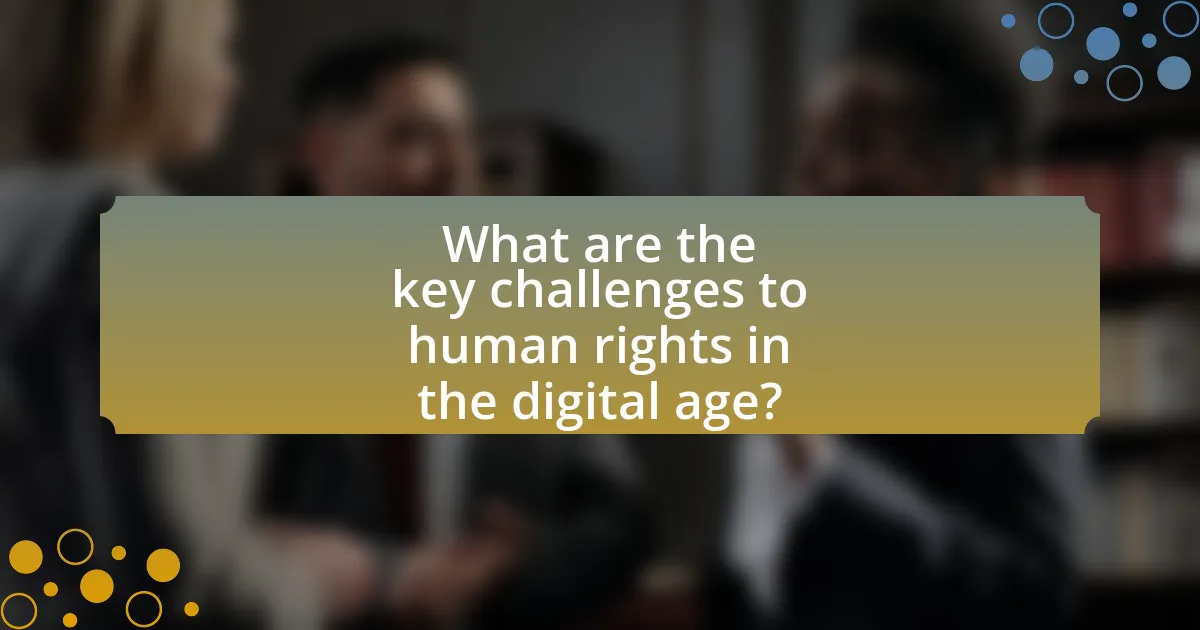
What are the key challenges to human rights in the digital age?
The key challenges to human rights in the digital age include privacy violations, surveillance, misinformation, and digital discrimination. Privacy violations occur as personal data is collected and exploited by corporations and governments without consent, undermining individuals’ autonomy. Surveillance has escalated with advanced technologies, leading to pervasive monitoring that infringes on the right to privacy, as evidenced by reports from organizations like Amnesty International highlighting mass surveillance practices. Misinformation campaigns threaten the right to access accurate information, impacting democratic processes and public trust. Additionally, digital discrimination manifests in algorithmic biases that disproportionately affect marginalized groups, raising concerns about equality and justice in digital spaces. These challenges collectively threaten the foundational principles of human rights in an increasingly interconnected world.
How do technological advancements pose risks to privacy?
Technological advancements pose risks to privacy by enabling extensive data collection, surveillance, and analysis of personal information. For instance, the proliferation of smartphones and IoT devices allows companies and governments to track individuals’ locations, behaviors, and preferences in real-time. According to a 2021 report by the Electronic Frontier Foundation, over 80% of mobile apps collect user data, often without explicit consent, highlighting the pervasive nature of data harvesting. Additionally, advancements in artificial intelligence and machine learning facilitate the processing of vast amounts of personal data, increasing the potential for misuse and breaches of privacy. These developments create an environment where individuals have limited control over their personal information, leading to significant privacy risks.
What are the most common forms of digital surveillance today?
The most common forms of digital surveillance today include internet monitoring, location tracking, and data collection through social media platforms. Internet monitoring involves the tracking of online activities by governments and corporations, often for security or marketing purposes. Location tracking is frequently conducted through GPS-enabled devices, allowing for real-time monitoring of individuals’ movements. Data collection through social media platforms occurs when user-generated content is analyzed for personal information, preferences, and behaviors, often without explicit consent. These practices raise significant concerns regarding privacy and human rights in the digital age, as they can lead to unauthorized access to personal information and potential misuse of data.
How do data breaches impact individual privacy rights?
Data breaches significantly undermine individual privacy rights by exposing personal information to unauthorized access and misuse. When organizations fail to protect sensitive data, individuals face risks such as identity theft, financial fraud, and loss of control over their personal information. For instance, the 2017 Equifax data breach compromised the personal data of approximately 147 million people, highlighting the severe consequences of inadequate data security measures. This breach not only violated individuals’ expectations of privacy but also led to legal actions and regulatory scrutiny, emphasizing the importance of safeguarding personal data in the digital age.
What are the implications of mass surveillance on society?
Mass surveillance significantly impacts society by eroding individual privacy and fostering a culture of fear and compliance. The constant monitoring of citizens can lead to self-censorship, as individuals may alter their behavior due to the awareness of being watched. Research conducted by the American Civil Liberties Union (ACLU) highlights that mass surveillance disproportionately affects marginalized communities, exacerbating existing inequalities. Furthermore, studies indicate that such surveillance practices can undermine trust in government institutions, as citizens may perceive their privacy rights as being violated. The implications extend to chilling effects on free speech and activism, as individuals may refrain from expressing dissenting opinions or participating in protests due to fear of repercussions.
How does mass surveillance affect marginalized communities?
Mass surveillance disproportionately affects marginalized communities by exacerbating existing inequalities and fostering an environment of fear and mistrust. Research indicates that these communities often face heightened scrutiny and profiling, leading to increased police presence and surveillance in their neighborhoods. For example, a report by the American Civil Liberties Union highlights that Black and Latino individuals are more likely to be subjected to surveillance technologies, such as facial recognition, which can result in wrongful arrests and discrimination. Additionally, mass surveillance can deter individuals from exercising their rights to free speech and assembly, as they may fear repercussions for expressing dissenting opinions. This creates a chilling effect that stifles activism and community organizing, further entrenching systemic injustices.
What are the psychological effects of living under constant surveillance?
Living under constant surveillance can lead to significant psychological effects, including increased anxiety, stress, and a sense of paranoia. Research indicates that individuals who perceive themselves as being watched may experience heightened levels of self-consciousness and fear of judgment, which can contribute to social withdrawal and decreased overall well-being. A study published in the journal “Psychological Science” found that constant monitoring can lead to a decline in mental health, as individuals feel their privacy is invaded, resulting in feelings of helplessness and loss of autonomy. Furthermore, the fear of being surveilled can inhibit free expression and creativity, as individuals may censor their thoughts and behaviors to conform to perceived expectations.
How can individuals protect their privacy in the digital age?
Individuals can protect their privacy in the digital age by utilizing strong passwords, enabling two-factor authentication, and being cautious about sharing personal information online. Strong passwords reduce the risk of unauthorized access, as studies show that 81% of data breaches are linked to weak passwords. Two-factor authentication adds an extra layer of security, making it significantly harder for attackers to gain access even if they have the password. Additionally, individuals should regularly review privacy settings on social media and other online accounts to limit the visibility of their personal information. According to a Pew Research Center survey, 64% of Americans have experienced a major data breach, highlighting the importance of proactive privacy measures.
What tools and practices can enhance personal privacy online?
To enhance personal privacy online, individuals can utilize tools such as virtual private networks (VPNs), encrypted messaging apps, and privacy-focused web browsers. VPNs encrypt internet traffic, making it difficult for third parties to monitor online activities. Encrypted messaging apps, like Signal or WhatsApp, ensure that communications remain private and secure from interception. Privacy-focused web browsers, such as Brave or Firefox with privacy extensions, block trackers and ads, reducing the amount of personal data collected. According to a 2021 report by the Electronic Frontier Foundation, using these tools significantly decreases the risk of data breaches and unauthorized surveillance, thereby reinforcing individual privacy rights in the digital age.
How can individuals advocate for their digital rights?
Individuals can advocate for their digital rights by educating themselves about privacy laws and digital rights issues, participating in advocacy groups, and engaging in public discourse. Knowledge of regulations such as the General Data Protection Regulation (GDPR) empowers individuals to understand their rights regarding personal data. Joining organizations like the Electronic Frontier Foundation (EFF) or Access Now provides platforms for collective action and resources for effective advocacy. Additionally, individuals can use social media to raise awareness and influence policy changes, as seen in campaigns that have successfully led to legislative reforms in data protection.
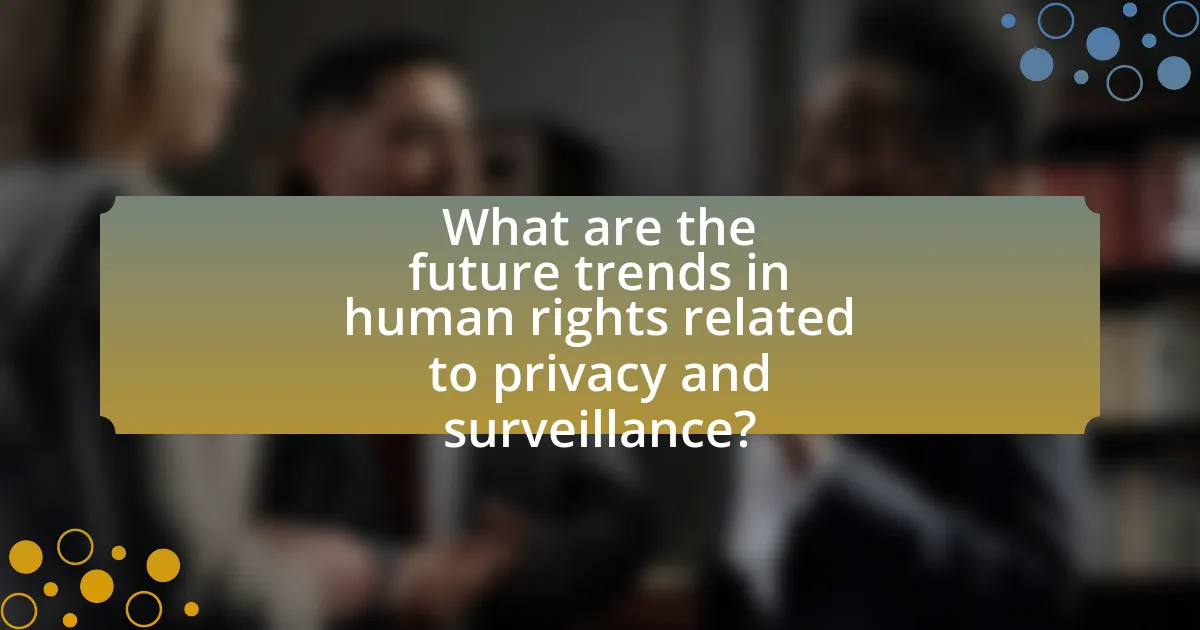
What are the future trends in human rights related to privacy and surveillance?
Future trends in human rights related to privacy and surveillance indicate a growing emphasis on data protection, increased regulation of surveillance technologies, and a shift towards greater individual control over personal data. Governments and organizations are increasingly recognizing the importance of privacy as a fundamental human right, leading to the implementation of stricter data protection laws, such as the General Data Protection Regulation (GDPR) in Europe, which sets a precedent for global standards. Additionally, advancements in technology, such as artificial intelligence and biometric surveillance, are prompting calls for ethical guidelines and oversight to prevent abuses. Reports from organizations like Amnesty International highlight the need for transparency and accountability in surveillance practices, reinforcing the trend towards protecting individual rights in the digital landscape.
How is technology evolving to address privacy concerns?
Technology is evolving to address privacy concerns through advancements in encryption, data anonymization, and privacy-focused regulations. Encryption technologies, such as end-to-end encryption, ensure that only authorized users can access sensitive information, thereby protecting data from unauthorized access. Data anonymization techniques, which remove personally identifiable information from datasets, allow organizations to analyze data without compromising individual privacy. Additionally, regulations like the General Data Protection Regulation (GDPR) in Europe mandate strict data protection measures, compelling companies to prioritize user privacy and transparency. These developments reflect a growing recognition of the importance of privacy in the digital age, as evidenced by increased public demand for data protection and the implementation of privacy-enhancing technologies.
What role do emerging technologies play in enhancing privacy rights?
Emerging technologies play a crucial role in enhancing privacy rights by providing tools and frameworks that empower individuals to control their personal data. Technologies such as encryption, blockchain, and privacy-focused artificial intelligence enable secure communication, data integrity, and anonymity, thereby protecting users from unauthorized access and surveillance. For instance, end-to-end encryption in messaging applications ensures that only the intended recipients can read the messages, significantly reducing the risk of data breaches. Additionally, blockchain technology offers decentralized data storage solutions that enhance user privacy by eliminating single points of failure and control. These advancements demonstrate a clear trend towards prioritizing individual privacy in the digital landscape, aligning with the growing demand for stronger privacy protections in an era marked by increasing surveillance and data exploitation.
How can artificial intelligence impact surveillance practices?
Artificial intelligence can significantly enhance surveillance practices by enabling real-time data analysis and pattern recognition. AI algorithms can process vast amounts of data from various sources, such as cameras and social media, to identify suspicious behavior or potential threats more efficiently than human operators. For instance, a study by the Brookings Institution highlights that AI-driven facial recognition technology can improve the accuracy of identifying individuals in crowded spaces, which can lead to faster responses in security situations. Additionally, AI can automate the monitoring process, reducing the need for constant human oversight and allowing for more comprehensive surveillance coverage.
What are the potential legal reforms needed for better protection of human rights?
Potential legal reforms needed for better protection of human rights include the establishment of comprehensive data protection laws, the implementation of stronger oversight mechanisms for surveillance practices, and the enhancement of legal frameworks that ensure accountability for human rights violations by state and non-state actors. Comprehensive data protection laws, such as the General Data Protection Regulation (GDPR) in the European Union, provide individuals with rights over their personal data, which is crucial in the digital age where privacy is often compromised. Stronger oversight mechanisms, including independent regulatory bodies, can monitor surveillance practices to prevent abuse and ensure compliance with human rights standards. Additionally, enhancing legal frameworks to hold violators accountable, such as through the establishment of international human rights courts, can deter future violations and promote justice for victims. These reforms are essential to adapt to the challenges posed by technology and ensure that human rights are upheld in the digital landscape.
How can international cooperation improve privacy protections?
International cooperation can improve privacy protections by establishing unified legal frameworks and standards that govern data protection across borders. Such collaboration enables countries to share best practices, harmonize regulations, and create mutual recognition agreements, which enhance the enforcement of privacy rights. For instance, the General Data Protection Regulation (GDPR) in the European Union has set a high standard for data privacy, influencing other nations to adopt similar measures. This collective approach not only strengthens individual privacy rights but also facilitates cross-border data flow while ensuring compliance with robust privacy standards.
What best practices should governments adopt to safeguard human rights?
Governments should adopt comprehensive legal frameworks that protect human rights, particularly in the context of digital privacy and surveillance. These frameworks should include clear regulations on data collection, usage, and sharing, ensuring that individuals have control over their personal information. For instance, the General Data Protection Regulation (GDPR) in the European Union sets a high standard for data protection, mandating consent and transparency from organizations that handle personal data. Additionally, governments must implement independent oversight mechanisms to monitor surveillance practices, preventing abuse and ensuring accountability. Research by the United Nations emphasizes the importance of safeguarding privacy as a fundamental human right, highlighting that excessive surveillance can lead to violations of freedom of expression and association. By establishing these best practices, governments can effectively safeguard human rights in the digital age.
What practical steps can individuals take to navigate privacy and surveillance issues?
Individuals can navigate privacy and surveillance issues by implementing strong digital security practices. This includes using strong, unique passwords for different accounts, enabling two-factor authentication, and regularly updating software to protect against vulnerabilities. According to a 2021 report by the Cybersecurity & Infrastructure Security Agency, 80% of data breaches involve weak or stolen passwords, highlighting the importance of robust password management. Additionally, individuals should utilize privacy-focused tools such as virtual private networks (VPNs) and encrypted messaging apps to safeguard their communications and online activities. Research from the Electronic Frontier Foundation indicates that using encryption can significantly reduce the risk of unauthorized access to personal data. Furthermore, individuals should regularly review privacy settings on social media and other online platforms to control the information shared publicly. By taking these steps, individuals can enhance their privacy and reduce the likelihood of surveillance.
